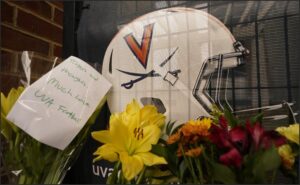
Pop up memorial. Photo credit: WTOP
by James A. Bacon
The shooting of five University of Virginia students Nov. 13 on a bus back from a field trip in Washington, D.C., was understandably traumatic for the young people who witnessed the horror, as it was for family and close friends of the victims, three of whom died.
Indeed, the event was a trauma for the entire UVa community, and the administration treated it as such. The University responded by launching into full therapeutic mode: canceling events and classes, giving students a pass/fail option in their courses, mobilizing counselors, and creating safe spaces.
“There is still profound sorrow and loss that we’re all feeling,” President Jim Ryan said Friday in briefing the Board of Visitors about the administration’s response to the shooting. The horror impacted far more than the homicide victims and those who witnessed the shootings, he said. The circle of those affected included medical professionals who responded to the shooting, football teammates, friends, roommates, and students who sheltered in place during the search for the killer. “This had a large ripple.”
Ryan listed key actions the administration took. Classes were canceled for two days. Events were canceled or rescheduled. Gathering spaces were set up where students could commiserate. Walk-in counseling was made available along with therapy dogs to comfort those in grieving. A basketball game was canceled, as was the remainder of the football season.
Provost Ian Baucom explained that the administration was concerned that the impact might linger and affect students’ ability to function academically. He asked faculty to provide maximum flexibility to allow students to deal with their grief and get them through the exam season, which wound up last week.
Immediately following the shooting, Baucom said, professors were asked to hand out no graded assignments and to impose no penalties for absence from class. Faculty also were directed to provide a grading option for the semester: students would be allowed to convert graded courses into pass/fails. Special consideration was given to students who were on the bus. Their grades as they stood before the tragedy counted as their grades for the entire course.
Robyn S. Hadley, the dean of student affairs, told the Board how the university formed work teams to deal with family liaisons, grief counseling, and communications. The goal was to help students “support and heal together.”
Concern extended beyond those directly affected by the tragedy, she said. One work team reached out to 1,000 students with a connection to a student directly affected.
The therapy dogs, said Hadley, received 700 visits.
“Our community pulled together in a way I’ve never seen before,” Ryan said. Thousands of students spontaneously gathered in a vigil on the Lawn. People created pop-up memorials and left flowers. A moving memorial service was organized. Hundreds of alumni called in with offers to help. The University set up a UVa Strong Fund to raise money for the families of the victims and provide financial support to affected students.
“Grief united the community that makes other differences seem small,” Ryan said, adding that he hoped the university could “hold on to the feeling that we have more in common.”
Ryan also praised Virginia Tech officials who shared their insights of what they had done right and wrong after the 2007 massacre.
Several members of the Board commended Ryan for his leadership in the aftermath of the killings. No one questioned the unprecedented academic leniency or any other aspect of how the administration handled the tragedy.


